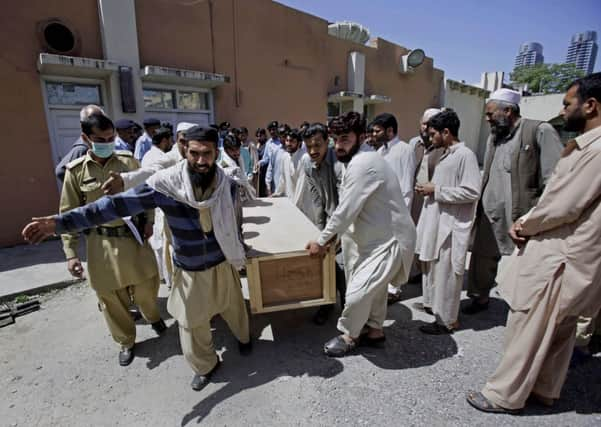Islamabad bomb kills 21 and endangers peace talks


The blast, early yesterday, was the latest attack to shake Pakistan even as government negotiations with the Taleban pick up pace in an attempt by the authorities to resolve years of conflict in which tens of thousands of people have been killed in the north-west.
The bomb went off as shoppers were buying supplies at the market.
Advertisement
Hide AdAdvertisement
Hide AdPolice quickly cordoned off the scene, which was littered with fruit, shoes, and prayer caps. Blood stained the ground in many areas.
“I saw body parts flying in the air,” said fruit trader Afzal Khan.
“People were dying. People were crying. People were running.”
The dead and the wounded were taken to nearby hospitals.
Nineteen of the dead were taken to the Pakistan Institute of Medical Sciences in Islamabad.
Dr Zulfikar Ghauri, from the accident and emergency department, said the hospital was treating 56 people wounded in the bombing.
Two bodies and 31 wounded were taken to Holy Family Hospital in the nearby city of Rawalpindi.
There was no immediate claim of responsibility, and the Pakistani Taleban denied responsibility, saying it was upholding a previously agreed ceasefire.
Police and officers from the bomb disposal squad were scanning the area for more devices.
Advertisement
Hide AdAdvertisement
Hide AdA police spokesman said the bomb probably contained about five kilograms (11lbs) of explosives.
The market is located near a makeshift camp for people displaced from fighting in Pakistan’s north-west, as well as refugees from Afghanistan.
It is also next to a supermarket serving middle-class Islamabad families.
While large bombings happen frequently in Pakistani cities such as the north-west city of Peshawar or the southern port city of Karachi, they are relatively rare in the capital.
An attack on a court complex on 3 March killed 11 people and was later claimed by a little-known group called Ahrar-ul-Hind.
Attacks such as yesterday’s have continued even as the negotiations between the government and the Taleban have picked up pace, leading to questions about whether the militant group is in full control of various factions that could be behind the attacks.
Dr Tariq Fazal Chaudhry, a politician from the ruling Pakistan Muslim League-N party, said it was difficult to say which group was behind the explosion until police complete their investigation.
Asked what the intended target was, he said: “I think peace in Pakistan is the target.”
Advertisement
Hide AdAdvertisement
Hide AdPrime minister Nawaz Sharif came to power last May promising to end the years of bloodshed through negotiation instead of military operations.
Government negotiators held direct talks with the Taleban on 26 March at an undisclosed location in the tribal areas, and on Saturday the government announced it would release 13 Taleban prisoners to facilitate the talks.
The militants have also declared a temporary ceasefire.
But many observers question whether it is possible to come to a peace deal with the militants, who they say have used previous peace deals to regroup and fight on. Critics also say that the faction-ridden Pakistan Taleban, known as Tehrik-e-Taleban, is incapable of ensuring all its factions respect any peace deal.